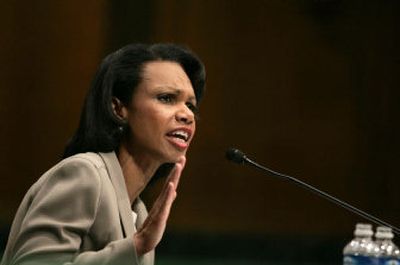Rice offers no withdrawal date

WASHINGTON – Secretary of State Condoleezza Rice faced testy criticism Wednesday from both Republican and Democratic senators for what they called a vague and troubled strategy in Iraq and for the administration’s refusal to offer a concrete timeline for the withdrawal of U.S. troops.
Rice avoided answering questions about whether American troops would still be in Iraq in five or 10 years, noting only that insurgents would continue to kill innocents for “a long time.” In a new effort to stabilize Iraq, she said the United States will deploy joint civilian-military teams throughout Iraq next month to foster nation-building, from courts and social services to sewage treatment.
The give-and-take underscored shifting opinion about the Iraq war on Capitol Hill, where lawmakers on the Senate Foreign Relations Committee appealed for greater candor and more concrete information. “We have to level with the American people,” said Ohio Republican George Voinovich.
Voinovich read the letter from a father whose son died in Iraq. “In the spirit of helping you gauge public opinion, it’s important to tell you that we do not consider the American mission in Iraq noble at all,” the father wrote. The father asked Congress to end funding for the “misguided effort that does not speak well for America.”
Sen. Barbara Boxer, D-Calif., told Rice that the American public is “sick at heart at the spin and false expectations. They want the truth, and they deserve it.” Putting up a chart, Boxer cited Vice President Dick Cheney’s comment in May that the Iraqi insurgency is in its “last throes,” then showed the spike in violent attacks since then.
Although Democrats have long challenged U.S. Iraq policy, Republican senators were also expressing concern. Committee chairman Sen. Richard Lugar, R-Ind., said the administration can no longer assume that creating democratic institutions in Iraq in the short term will diminish the insurgency, which could have long-term implications. “Permanent instability or civil war in Iraq could set back American interests in the Middle East for a generation, increasing anti-Americanism, multiplying the threats from tyrants and terrorists and reducing our credibility,” he said.
Of the 14 senators in attendance, only two – George Allen, R-Va., and Mel Martinez, R-Fla. – offered broad support of Iraq policy.
Except for budget testimony, it was Rice’s first appearance before the panel since her confirmation hearings in January. A congressional source said the committee has been trying to organize the hearing since Labor Day, but the State Department was unable to find time until now, four days after Iraqis voted on a new constitution.
Rice told the panel that U.S. strategy was to “clear, hold and build,” while insurgents’ goals are to “infect, terrorize and pull down.”